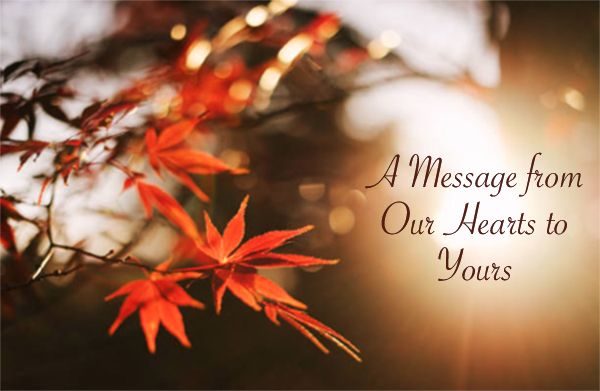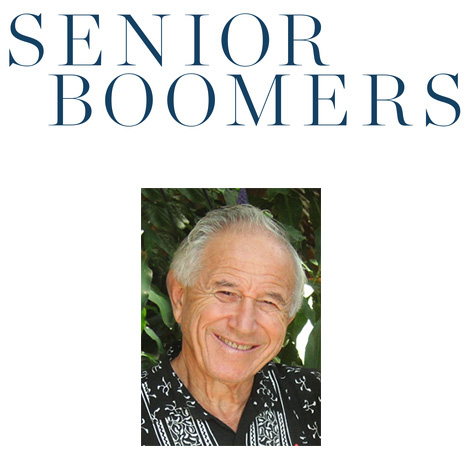


by Jerry Jampolsky
I woke up on the morning of my 94th birthday and, quite unceremoniously, entered my 95th year. One of the things my wife, Diane, and I do daily upon awakening is express gratitude for another day of living and commit to making that day the best and the happiest day of our lives, regardless of what life puts on our plates and regardless of the state of our bodies.
Click here to read the full article.
I woke up on the morning of my 94th birthday and, quite unceremoniously, entered my 95th year. One of the things my wife, Diane, and I do daily upon awakening is express gratitude for another day of living and commit to making that day the best and the happiest day of our lives, regardless of what life puts on our plates and regardless of the state of our bodies.
Your happiness level is, reportedly, influenced 40 percent by genes and 15 percent by circumstances. That means it’s 45 percent up to us to determine just how happy we want to be, based on our belief systems and our attitudes about life. That is really good news.
The bad news is that our culture continues to market “antiaging” as an antidote to growing old. If we really understood this special time and what it means to be an older adult, we would not fear aging, but meet it head-on. I am one of those who do not think I have gone out to pasture and who believe that what I do, say or write about can still make a difference. I remain fully alive and fully engaged in life around me.
Living Life to the Fullest
My wife is a baby boomer born in 1946 and her life experiences have spanned from the postwar tradition-minded ’50s to the tumultuous and rebellious ’60s, Vietnam, the women’s movement, the civil rights movement and beyond. Like Diane, many women began their lives surrounded by people in strictly traditional roles, and many redefined what it means to be an independent and equal human being in modern times. The term baby boomers encompasses most of what her generation has undergone.
Likewise, my generation, 75 to 95 years of age, represents a breadth of experiences, accomplishments, discoveries and courageous acts. I see some of us as what I call “ senior boomers,” people who may have changed the way they look at the world and decided to look through the eyes of love instead of fear. They don’t make the past and the future their enemy. Instead, they make friends with the present, which allows them to live life to the fullest.
A senior boomer is a love finder rather than a fault finder, a love giver instead of a love seeker. For people at this stage, the purpose of life is to be a messenger of unconditional love wherever they go.
Remembering that anyone can make a difference at any age, I as a senior boomer continue to be vital, creative and involved. Age does not have to be a limitation. My experiences are deeply shaped by either the optimism or pessimism with which I look at the world. I get to choose how I experience each and every day. That is a power many of us do not realize we possess.
I continue to write articles on a regular basis, have recently had two new books published and am starting a third, all since I entered my 90s. I go to the gym four to five times per week because I believe that keeping my body in shape helps keep my mind active and my imagination and creativity flowing.
Changing Times
When I was born, the life expectancy of men in America was 57 years and for women it was 60. When Diane was born men generally lived to age 64 and women to age 69. We are now redefining what it means to live beyond age 75 in modern times and we have choices no other generation has had.
Living long past retirement age, we often have a few decades or more to redefine our lives and to pursue additional meaning. What a gift the years can bring if we choose to see it that way. I always like to ask myself the following question about my choices: “Am I making this decision based on love? Or am I making it based on fear?” The answer I choose invariably determines my direction and the outcome.
After decades of working as a psychiatrist, I believe more firmly than ever that our attitudes, more than anything else, shape our experiences. I have often found that the most important task we have to complete before we can experience real happiness is to shift our attitudes so that we forgive ourselves and everybody else, completely.
Children have often been my best teachers. They typically don’t hold on to grievances like adults do and they get over their anger at one another rather quickly because for them there isn’t any value in staying mad. I personally keep a 4-year-old child alive inside me to remind myself of being playful and the importance of having fun and even of feeling comfortable being silly. As I keep that child alive, I hold innocence, wonder and love within myself and can readily share it with others.
Many senior boomers know the mutual joys of interacting with grandchildren, but whether you are related by blood or not, contact with younger people can have deep emotional rewards. Older people often have the time, talent and ability to volunteer alongside young people or mentor them as they begin to navigate the working world. Seniors, with their maturity, perspective and depth of experience found nowhere else in our culture, bring unique value to such encounters. Organizations like Encore.org and Experience Corps can guide us toward meaningful, life-enhancing opportunities to really make a difference in the lives of others. It’s my impression that the people who are happiest do what they love, as often and for as long as they can.
Coming to Terms with Aging
As we age it is inevitable that we lose many more family members and friends. One of the factors that help define whether seniors are happy, content and at peace is whether or not they have come to terms with their own death. Some are guided and comforted by a traditional theology, often long held, while others are redefining what it means to experience dying. Those who keep a distance from the subject are often driven by fear of the unknown and of separation. How well we have done our work around dying often dictates how well we live the rest of our lives.
It seems to me that many senior boomers have come to realize just how important healing all their relationships can be. They seem to pay more attention to keeping a peaceful mind than to keeping old grievances and grudges alive. Being more lighthearted allows them to not take themselves and everyone else so seriously. They wake up and not only decide to make this day their happiest but remind themselves how important it is to not pass judgment on others or on themselves. They see peace of mind as part of their spiritual DNA; they believe part of that DNA is happiness and that we are happiest when we are giving our love away.
They seem to have no enemies anymore because they have realized it takes a whole lot more energy to keep their anger alive than it does to forgive, and that forgiveness really is the key to happiness. Perhaps best of all, they can experience peace inside even when there is chaos going on all around them.
Senior boomers are often delighted to find that their later years have turned out to be the best years of their lives. They no longer feel the need to prove themselves and are no longer afraid of failure, knowing that failures often pave the way for success. Many seem to have a lot of gratitude and do their best to see the light in others, regardless of other people’s behavior. Basically, they have found that the more love they bring to each encounter, the more love they receive. After these many years, I am convinced more than ever that no matter what the question, or the problem, or the illness, or the pain, whatever the conflict or fear, love is the answer.
Love is always the answer, because love is everything.
This article originally appeared in Marin Magazine’s print edition with the headline: “Senior Boomers”.
|








